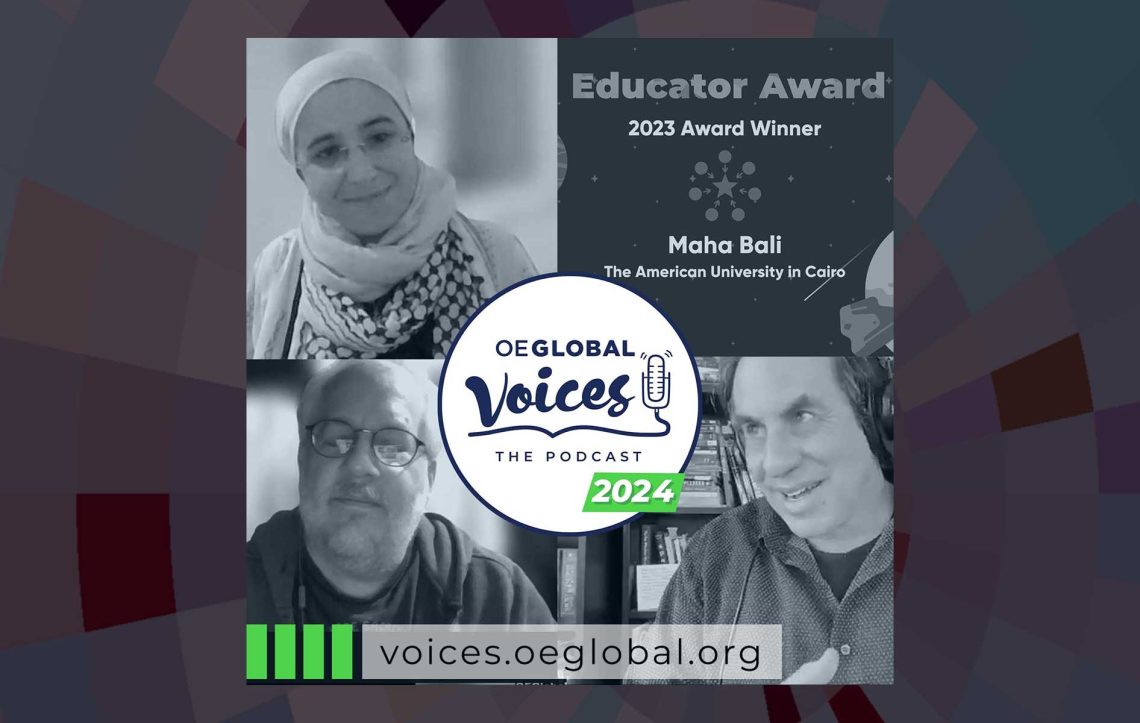As a special event during Open Education Week 2024, we opened up the podcast studio for anyone to join us in conversation with Maha Bali, professor of practice at the Center for Learning and Teaching at The American University in Cairo (AUC). This episode is part of our series honoring winners of the 2023 Open Education Awards for Excellence, in which Maha was recognized with an Individual Award in the Educator Category.

As always, Maha fills the room with her dedication to educating at all levels and demonstrating the practices of critical pedagogy and Intentionally Equitable Hospitality. She shared a description of what we’d see and experience in her teaching environment, how she supports her visually impaired students, critical AI literacy, her engaging style of facilitation, the idea of “iterating towards justice”, and much more.
Maha enlightens us about learning in every way possible, including what she learned and teaches us about “being brave enough to be bad” at crochet.
We hope you enjoy this wide ranging conversation. Thanks as well to Jonathan Poritz and Nate Angell for being there in the studio with us.
In This Episode
FYI: This section of show notes alone was generated by AI Actions in the Descript editor we use to produce OEG Voices.
This episode features a rich conversation between Alan Levine from Open Education Global and the OE Award for Excellence winner, Maha Bali. They discuss intercultural elements in education, the integration of technology in learning, and the importance of accessibility and equity in educational environments. Maha shares insights into her teaching practices, the dynamics of her classroom, and her advocacy for visually impaired students. The discussion also touches on the challenges and possibilities offered by AI in education, the evolution of Maha’s courses, and her approach to fostering an inclusive and engaging learning environment.
- Intercultural Education and Technology Integration
- Accessibility and Equity in the Classroom
- Interactive and Inclusive Teaching Practices
- Reflections on AI in Education
- Award Reflections and Open Conversations
Audio Note: Unfortunately we lost brief bits of the recording with network issues, note that at around 8:24 where Maha mentions the name of her course, the correct name is “Digital Literacy, AI Literacy and Intercultural Learning.”
Podcast: Play in new window | Download
at Descript.com
Additional Links and Quotes for Episode 66
I add also coincidentally, four of my students are visually impaired this semester. So it’s like really out there, like I’ve never had that many in one semester. And I have this point though, it becomes really noticeable that first of all, it’s not like you have one, you have four. And it becomes a thing, like they’re not a minority in terms of numbers in my class, they’re really noticeable and they make a huge difference just being there. And it makes everyone in the class become more aware and everybody has a role.
And one of the things that we’ve been talking about in terms of like, when we used to talk about Intentionally Equitable Hospitality, we used to focus a lot on the facilitator’s role of making sure equity is intentional and making sure everyone’s welcome.
But actually it’s everybody’s role.
Maha Bali on intentionally equitable hospitality in her classroom
- Maha Bali 2024 Individual OE Award for Excellence, Educator (OE Global)
- Maha Bali (blog)
- Openness as a Way of Being (Teaching in Higher Ed podcast episode 493)
- Yasser Tamer Atef 2024 Individual OE Award, Student
- Intentionally Equitable Hospitality as Critical Instructional Design, Maha Bali and Mia Zamora (in Designing for Care)
And when it’s collective and how all these things feed into ecosystems of care. How that helps us move towards more social justice. I don’t know if we talked about this before or during the recording, but it’s like distributed responsibility for being equitable. For that to happen, everyone needs to have a sense of what it means that there are inequities here and to notice the inequities and then to be willing to address them and wanting to address them.
Maha Bali on equity and care
- Accessibility Tips (YouTube playlist)
- Quick, Draw! (Google)
- DS106 Assignment Bank (DS106)
- AI Pedagogy Project (Harvard)
- Resources on Critical AI Literacy (Maha Bali blog)
Let’s step back a second. So AI exists for a really long time. And Machine Learning has existed for a really long time. And, when I was an undergrad 20 years ago, I created a neural network that used machine learning to do something, right?
This has existed for a long time. It’s been used in medicine. It’s been used in a lot of different fields. if you understand the basic way it works, it helps explain a lot of things.
So whatever is changing, we’re still basically pretty much the same kind of technology, or elaborate, but it’s, if you understand that, that helps you understand a lot why it will always hallucinate, because it’s not meant to not hallucinate. We’re talking about machine learning and not expert systems that are trained to think like a particular expert, it’s trained to learn randomly, and then probabilistically, and so on. Yeah, the statistical model.
Maha Bali on machine learning and AI
- Virtually Connecting
- VC@ Creative Commons Summit 2017 (Virtually Connecting)
- Equity Unbound
- Mid Year Festival Myfest2024 (Equity Unbound)
- On Being Brave Enough to Be Bad while Learning Crochet (Maha Bali blog)
So when you do something and they do it wrong and then you have to undo it and then you have to redo it again. And someone was talking about how important it is to be comfortable being bad at something new. We’re always bad when we’re new. if you were good at everything you’re new at, like that would be weird. Then what would be the point of experience? What would be the point of doing something for a long time, right?
Maha Bali on On Being Brave Enough to Be Bad while Learning Crochet
Our open licensed music for this episode is a track called I Dare You by Little Glass Men and is licensed under a Attribution License. Like most of our intro music, it was found at the Free Music Archive (see our full FMA playlist).
This was another episode we are recording on the web in Squadcast. This is part of the Descript platform for AI enabled transcribing and editing audio in text– this has greatly enhanced our ability to produce our shows. We have been exploring some of the other AI features in Descript, but our posts remain human authored unless indicated otherwise.














